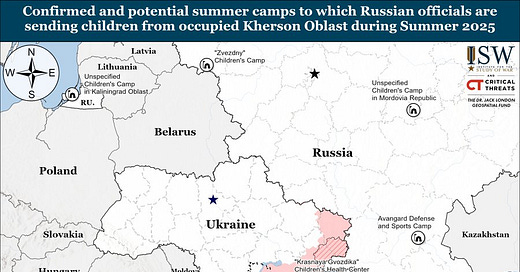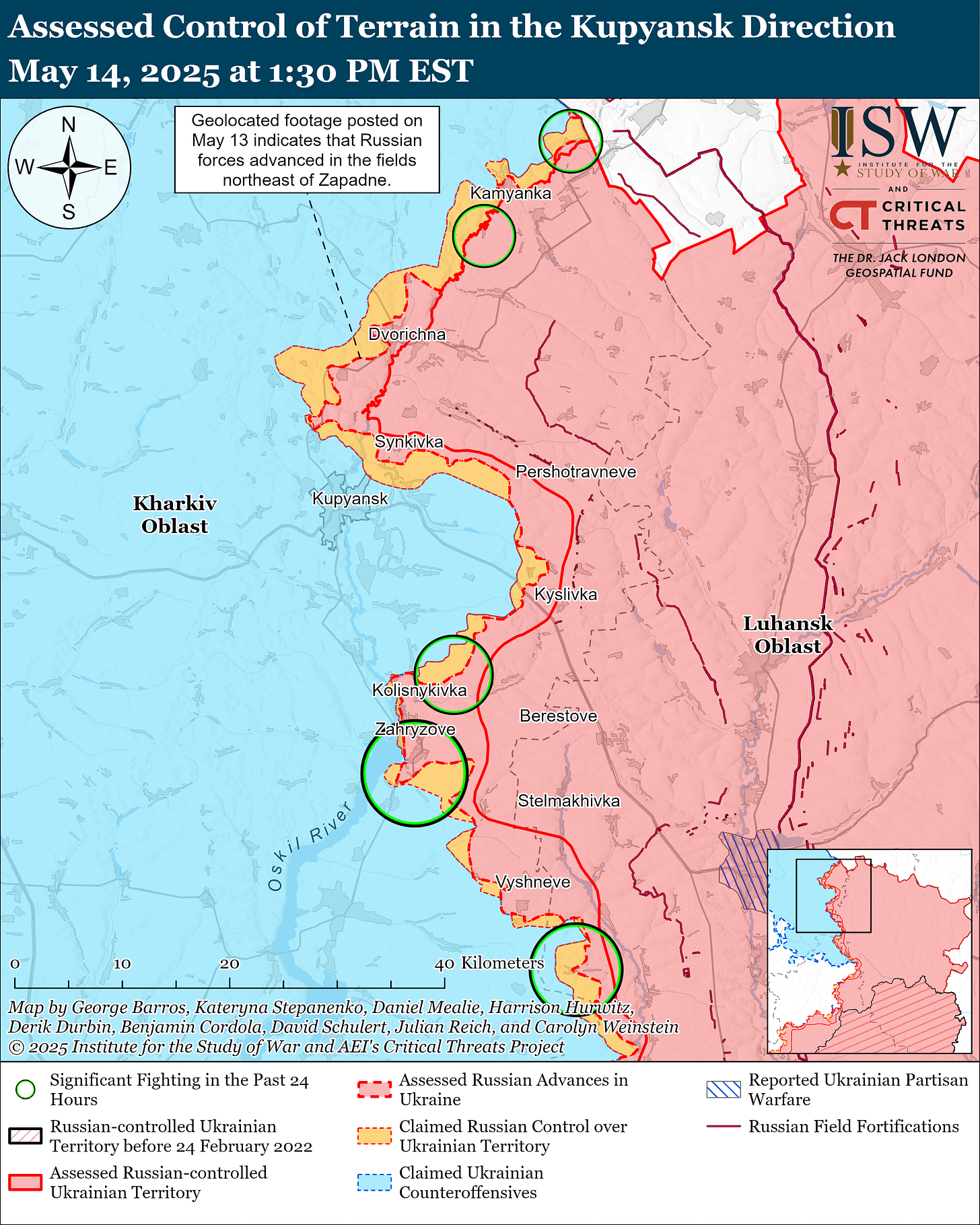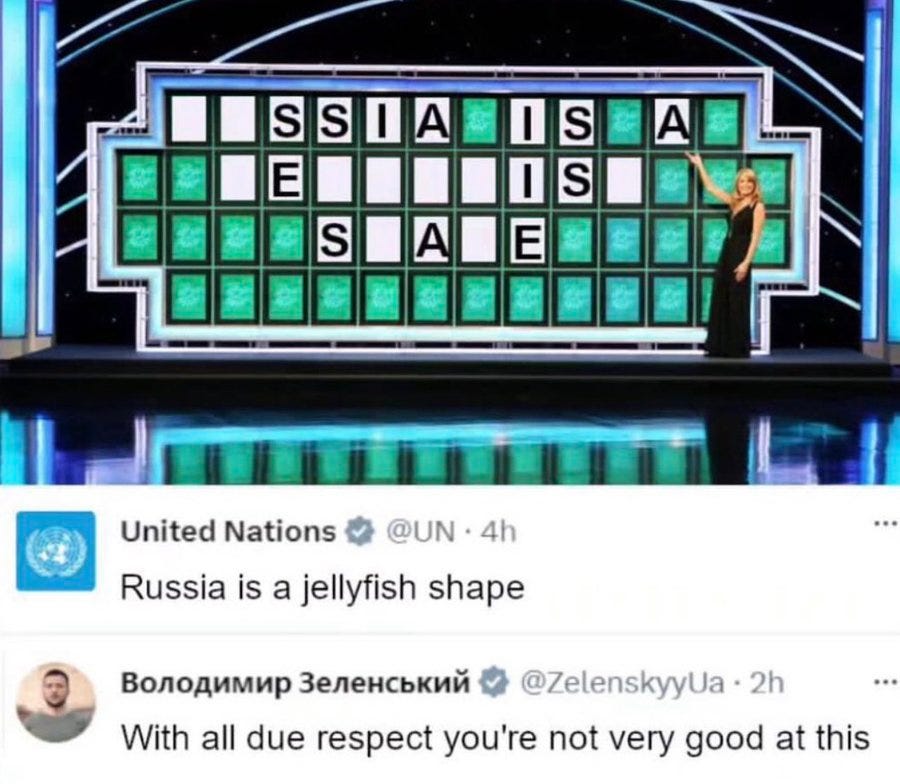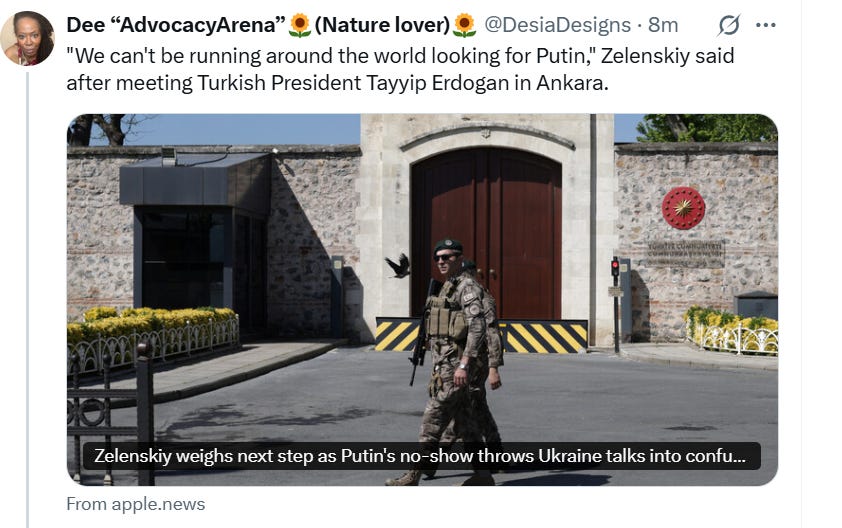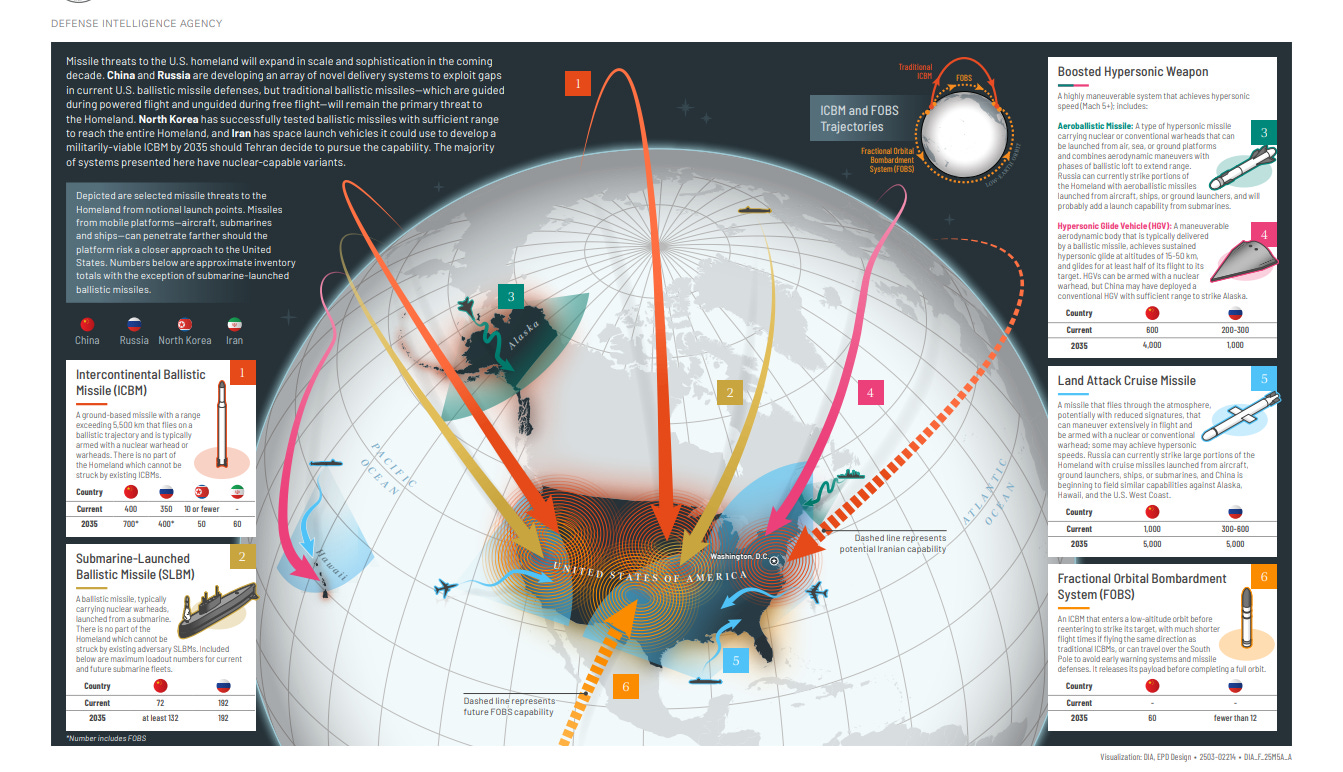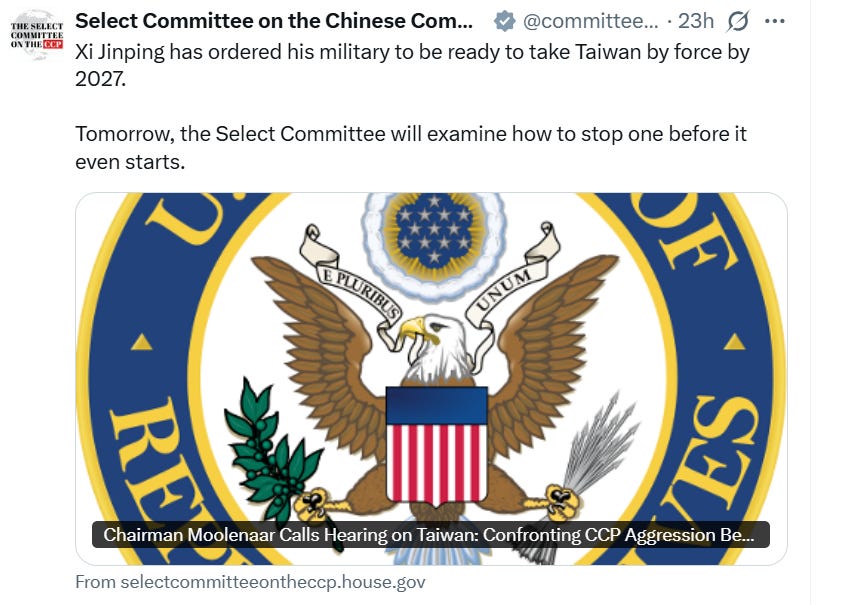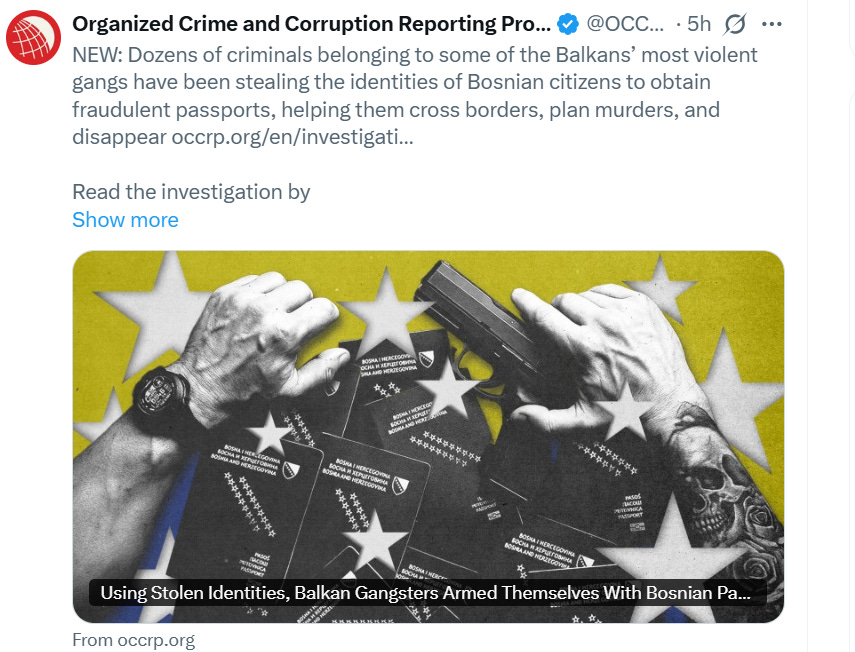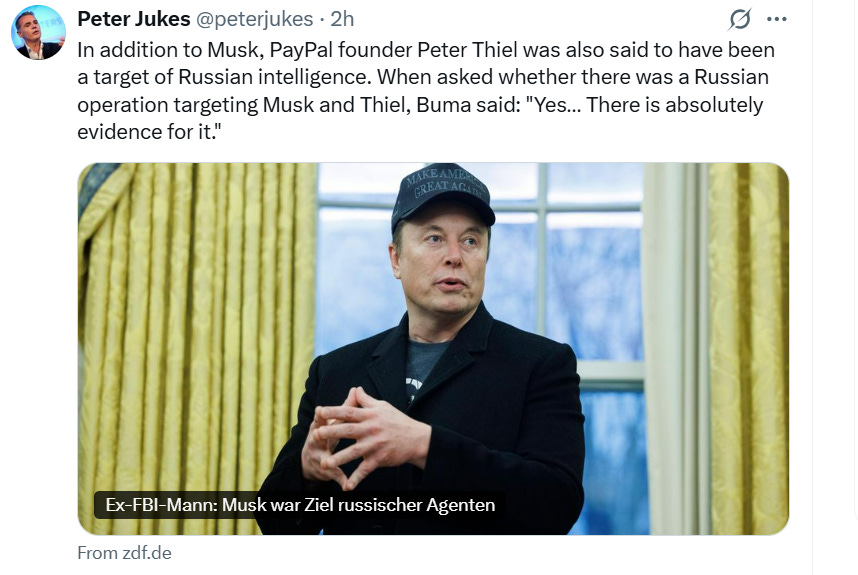May 16: E-Stories
InUkraine CombatSitRep BehindLines Russia-China InEurope InOtherNews VyshyvankaDay RuCampsKids TurkeyTalks ZNPP USDefReport Taiwan ChathamHouse NATO
Catching up…
For specific news about Trump, his regime and its dealings with Russia, I direct you to Olga’s substack. She and Julie Roginsky publish a weekly podcast, “Pax Americana”, which is highly informative.
For a general view of news from various geopolitical threatres, Scott’s EA Worldview is always superb.
The so-called ‘peace talks’ seem to have started out ‘well’ yesterday:
Russia [spread] false claims about “peace talks starting in Turkey at 10 AM Moscow time.” This is not true and has not been confirmed by Ukraine. No such meeting was scheduled. It appears to be a disinformation effort to pressure Ukraine by framing it as the only party not seeking negotiations.
Stories we’re following…
The Zaporizhzhia Nuclear Power Plant (NPP) has been relying on a single power line for over a week to supply the electricity necessary to maintain key nuclear safety functions.
It is noted that the only backup power line to the Zaporizhzhia NPP, with a capacity of 330 kilovolts (kV), was disconnected on 7 May, leaving the plant fully dependent on the only functioning 750 kV line.
The IAEA stated that the damage occurred in territory controlled by Ukraine, some distance from the plant, and that the Ukrainian power system operator is currently unable to carry out repairs due to active hostilities in the area.
The IAEA reiterated that the six reactors at the Zaporizhzhia NPP have been shut down since mid-2022, but they still require external power for fuel cooling and minimising the risk of an accident. Before the full-scale invasion, the plant had access to ten power lines, which ensured reliable external power supply.
Suspilne, citing the air force, reported that Ukraine’s air defences shot down 62 of 110 drones fired at Ukraine overnight by Russia. 29 were lost in the air. It reported that “Sumy, Dnipropetrovsk, Poltava, Kyiv, and Ivano-Frankivsk regions were affected by the attack.”
‘My heart goes out to the beloved people of Ukraine’ — Pope Leo XIV receives list of Ukrainian POWs at Vatican. The Ukrainian delegation present in the Vatican included the head of the Ukrainian Greek Catholic Church, Sviatoslav Shevchuk, who congratulated Pope Leo XIV on his election.
Ukraine's gas storage reserves fall to their lowest level in at least 11 years. Ukraine's underground storage facilities are currently using 19.4% of their capacity. Almost 32%, or 2.79 bcm, less gas is available in the storages than in the previous year, according to the estimates.
Meduza: Ukrainian psychologist Elina Bytyuk explains how war affects children
On April 4, 2025, a Russian missile strike on the city of Krivyi Rih killed nine children, most of whom were playing in a park. The U.N. Human Rights Office said the attack, which killed 20 people in total, was the deadliest single strike to claim children’s lives that it had verified since Russia began its full-scale invasion of Ukraine in February 2022. The U.N. has recorded more than 2,500 child casualties but notes the actual toll is likely far higher, particularly when considering the scale of damage to children’s mental health and well-being. The psychological toll on Ukrainian children is even more widespread. To understand the war’s impact on children, Meduza spoke with Elina Bytyuk, a psychologist at the Dnipro-based nonprofit Children New Generation.
Chatham House: Russia’s full-scale invasion of Ukraine in early 2022 caused a huge exodus of refugees, now estimated to number almost 7 million (one in six of the pre-war population).
The longer the war continues, the fewer refugees are likely to return home. The resulting loss of human capital and capacity presents a serious problem for Ukraine both economically – in addition to directly war-related economic damage – and demographically. Without the return of substantial numbers of refugees, if and when the possibility exists for them to do so safely, Ukraine’s enormous reconstruction needs will be that much harder to meet.
This paper analyses the impacts, both on Ukraine and host countries, of the outflow of refugees since 2022.
Register here online or in person for the event.
Combat Situation
Ukrainian aviation continues to strike key Russian positions across all fronts. A mixed strike group recently targeted multiple bridges and crossings in the northern direction. One of the strikes eliminated Russian infantry at a crossing near the settlement of Zvanivka.
Ukrainians retake ground near Pokrovsk while Russians advance in four other sectors Ukrainian forces moved forward on two axes east and southeast of Donetsk's Pokrovsk, ISW says. Deep State stated Nové north of Lyman fell to the Russians.
RFE/RL: On the front line in the Sumy Region, Ukrainian forces are repelling Russian assaults and pushing into Russia’s Kursk and Belgorod regions.
Russia is quietly amassing forces near the front for a new offensive aimed at seizing more territory, CNN reports. US officials say Putin still seeks gains in eastern Ukraine—possibly even near Kyiv—despite US calls for a 30-day ceasefire.
The US is proposing to resume security talks within the NATO-Russia Council, according to Bloomberg. he NRC has not met since Russia’s full-scale invasion of Ukraine in 2022.
In the meantime, Putin extended Russia’s current defense strategy to 2027 amid expected peace talks with Ukraine in Turkey. The extension of the current defense plan, initially set for 2021–2025, was confirmed by the Kremlin, though specific details remain classified.
ISW: The Kremlin has been desperately trying to present Putin as an effective wartime leader through staged overtures and info ops. It is a lot of posturing for a guy who has failed to achieve almost any of his stated military objectives three years into Russia’s war against Ukraine, despite an estimated 900,000 Russians killed and wounded, while he himself has publicly appeared on the frontlines only three times since 2022.
Norwegian Defence Minister Tore O. Sandvik has confirmed that the delivery of the F-16 fighter jets pledged to Ukraine will be completed in 2025.The Norwegian defence minister stated that Ukraine had received "some aircraft", while the remaining jets will be handed over within 2025. Sandvik added that the transfer of Norwegian F-16s is proceeding as planned, but for operational security reasons and following consultations with Ukraine, the number of aircraft delivered will not be disclosed. He also recalled that in 2024, the Norwegian government increased its support for Ukrainian air defence by NOK 1.3 billion (approx. US$124.8 million).
Estonian navy and NATO aircraft tried to stop a Russian “shadow fleet” tanker headed to a Russian port with unknown cargo. The crew ignored orders to divert to Estonia. European forces attempted to board — but a Russian Su-35 showed up, and the assault was called off.
Behind the Lines
The US and Europe have convinced President Zelensky to agree to talks with Russia in Istanbul on 15 May.
Two unnamed diplomats told the WaPo that Zelensky had been frustrated by how the situation with potential talks in Türkey had developed this week and said he would not even allow a meeting between the Ukrainian and Russian delegations. "Zelensky didn't see the point in going at all," one of the sources told The Washington Post.
Representatives of European countries and the US explained in private that it was important for Ukraine to at least send a delegation of high-ranking officials to Istanbul, including Andrii Yermak, Head of the Office of the President, and Foreign Minister Andrii Sybiha.
Zelensky met with Erdoğan in Ankara to make decisions on “next steps” in potential talks with Russia, a Ukrainian official told AFP. The Ukrainian delegation, including Defense Minister Rustem Umerov and SBU chief Vasyl Malyuk. They will face a Russian delegation consisting of low-level officials, Putin refused to come in person.
Zelensky: "We do not recognize occupied territories. Crimea is part of Ukraine under our Constitution, and Erdogan supports this stance." Discussing territorial issues is a violation of the Ukrainian Constitution.
President Zelensky: "A good and productive meeting with President Erdogan in Ankara on peace and security. Grateful for Turkey’s support of a complete ceasefire and real diplomacy. Russia showed it’s not serious about peace by sending a weak delegation—this is disrespect to the world. We expect strong responses from our partners. We also discussed ceasefire monitoring, maritime demining, Ukraine’s reconstruction, and deeper cooperation."
Putin announced on Wednesday that he would send Vladimir Medinsky, a presidential adviser, to lead the Russian delegation. In attendance, according to the RIA news agency, were:
foreign minister Sergey Lavrov
defence minister Andrey Belousov
director of the national guard Viktor Zolotov
secretary of the security council Sergei Shoigu
chief of the general staff Valery Gerasimov
FSB director Alexander Bortnikov
Lavrov statement ahead of talks: “The West wants a ceasefire only to help Kyiv prepare for more fighting.”
He calls Zelensky “a pathetic man” over his demand for Putin’s presence in Istanbul, says “the British are leading him through the jungle of international politics,” and warns Western capitals are “asking for confrontation with Russia.” He adds: “With Trump, U.S. diplomacy has returned to normal—dialogue is necessary.”
Estonia foreign minister: Russia sending low-level delegation to peace talks is 'slap in the face'. Estonian foreign minister Margus Tsahkna said on Thursday that Putin sending a low-level delegation to Turkey for talks regarding the war in Ukraine was “like a slap in the face.”
Rubio says US 'doesn't have high expectations' for Ukraine-Russia talks. The US secretary of state, Marco Rubio, said he will meet with Turkey’s foreign minister, Hakan Fidan, and a senior Ukrainian delegation in Istanbul on Friday.
“I hope that those talks will be between Ukraine and Russia, with Turkish counterparts in the room, along with someone from our team or members of our team at the appropriate level,” he said, adding:
But I want to be frank, I don’t think we don’t have high expectations of what will happen tomorrow.
I think it’s abundantly clear that the only way we’re going to have a breakthrough here is between President Trump and President Putin.
Estonian PM Kristen Michal has said that a Russian fighter jet violated Nato territory for a duration of one minute, Reuters reports. He described the situation as very serious. He said the jet was sent as Estonia was attempting to detain a Russian shadow fleet tanker.
Nato ministers including UK foreign secretary David Lammy met in Turkey yesterday. Britain and its military allies will be working to “step up” their collective security at the gathering in Antalya, Lammy said.
Today, President Zelenskyy is in Turkey in a further demonstration of his commitment to peace, ready to enter talks direct with Russia and continuing to push for a full ceasefire as a first crucial step.
Ukraine invitation to NATO Summit: "The decision to invite Zelensky to the NATO summit won’t be made by the U.S.," says Dutch FM Caspar Veldkamp.
“I’d be very glad to welcome President Zelensky and the Ukrainian delegation to The Hague, but the invitation is up to the NATO Secretary General.”
'We didn't oppose it' — Rubio denies opposing Zelensky's participation at NATO summit. U.S. Secretary of State Marco Rubio on May 15 denied reports that the United States opposes President Volodymyr Zelensky's participation at the upcoming NATO summit in The Hague.
Russian political, corporate interests seize thousands of Ukrainian businesses, assets in occupied Mariupol, research reveals. More than 1,000 Russian government entities and 1,200 private companies are involved in the economy of occupied Mariupol, a major southeastern city occupied by Russia after it invaded Ukraine in 2022, according to a research paper published on May 14.
Council of Europe backs special tribunal for Russian aggression against Ukraine. The Council of Europe on May 14 approved the creation of a special tribunal to prosecute Russia's top leadership for the crime of aggression against Ukraine, Ukrainian lawmaker Maria Mezentseva reported.
President Zelensky spoke about the special relationship he has developed with his French counterpart Emmanuel Macron since the start of Russia’s full-scale invasion of Ukraine.
"It began during the war, and it was the same with some other heads of state and government. But not many – two or three with whom I spoke constantly on the phone. I convinced everyone long ago to use phone calls rather than secure lines – frankly, I don’t believe in secure lines."
Zelensky said that Macron "approaches things very creatively" and "is ready to take risks".
"And people who are ready to take risks are people focused on results," Zelenskyy added. "He is also one of the strongest leaders in the world. He finds ways out of difficult situations, and I respect that."
At the beginning of the full-scale invasion of Ukraine, president Zelensky spoke with president Macron.
FT: Inside the Trump administration’s quiet shift on Ukraine
“The Americans had this simplistic idea — let’s charm Russia, put pressure on Zelenskyy, and we’ll get a deal,” said Wolfgang Ischinger, the former German ambassador to the US to whom Vance made his comment at last week’s forum. “It turned out that simply charming Russia is not enough.”
Trump’s most desired objective — a ceasefire that could lead to peace negotiations and an end to the war — has so far eluded him. Putin has rejected international calls to halt the fighting, despite threats from western powers — including the US — of tough new sanctions.
Russia’s apparent intransigence is proving an irritant to Trump, say observers. “You hear the frustration in [his] communication,” said Michael McFaul, a former US ambassador to Russia. “He may be understanding that he has given up too much and not gotten anything in return.”
Trump’s social media posts reflect his apparent impatience. In late April, after Russia fired missiles into civilian areas of Ukraine, he said he thought the Kremlin was “just tapping me along” and threatened to impose secondary and banking sanctions on Moscow.
“Trump is concluding that Putin is not a friend of the US,” said Bill Taylor, who served as the US ambassador to Ukraine from 2006-09. “There’s a recognition that [he] is not to be trusted . . . that he is not negotiating seriously.”
It is becoming increasingly difficult to blame the Ukrainians for the continued fighting. In recent weeks Zelenskyy has gone out of his way to present himself as a co-operative partner, supporting US demands for a ceasefire. On Sunday he agreed to the Putin proposal of direct talks in Turkey after Trump urged him to accept it.
Meanwhile in Russia & China…
The Defense Intelligence Agency presented a chart presented a chart summarizing possible advances in missile capabilities among the country's adversaries - China, Russia, Iran and North Korea. For example, the number of land-based ICBMs with nuclear warheads and a range of more than 5,500 km in China's arsenal could increase from 400 to 700 by 2035, Russia's - from 350 to 400, North Korea's - from 10 or less to 50, Iran's - up to 60 (it currently has no such missiles).
More significantly, China and Russia could become the owners of 60 and "less than 12" nuclear missiles of the "fractional orbital bombardment system" (FOBS), respectively, capable of reaching the United States much faster, Bloomberg notes .
The weapon enters “a low-altitude orbit before reentering to strike its target, with much shorter flight times if flying the same direction as traditional ICBMs, or can travel over the South Pole to avoid early warning systems and missile defenses,” the agency said. “It releases its payload before completing a full orbit.”
DIA projected China could possess 60 of these weapons by 2035 from none today, and Russia 12 from zero today.
Christian Caryl, Why This Is the Best Time to Sanction Russia
On April 25, the Russian Central Bank affirmed that it was keeping its main interest rate at an eye-watering 21 percent—the highest in two decades. Under its redoubtable governor, Elvira Nabiullina, the bank appears determined to stay the course in its long-running effort to contain rising inflation. Nabiullina and her colleagues took the rate decision despite a veiled criticism by Putin, who clearly wanted the bank to lower its prime lending rate. He used a bizarre image to drive home the point, warning unnamed officials against subjecting the economy to “excessive cooling like in a cryotherapy chamber.”
The main culprit for this high price level is clear: The Kremlin has been pumping vast amounts of money into its war against Ukraine. Last year, the Russian government announced that it was raising defense spending to 6.3 percent of GDP—the highest level since the Cold War. Even that number likely doesn’t capture the full magnitude of expenditures. The rise in inflation means, among other things, that the government will find it difficult to spend its way out of a crisis—something sanctions designers should take into account.
Russian ingenuity in evading the sanctions and finding new markets for its ample oil and gas—above all in China and India—has allowed Putin to keep funding the war at high levels.
Now, though, the good times appear to be coming to an end. Even as inflation remains persistent, growth is stalling, falling from 5 percent in 2024 to an annualized rate of around zero at the start of this year, prompting some observers to warn of stagflation. Many businesses struggle with sinking profits and debts they can’t pay back, prompting some managers to predict a wave of corporate bankruptcies. The labor shortage caused by the defense boom has left private businesses starved for workers. Making the shortage worse, deepening xenophobia has led to mass deportations of Central Asian migrant workers—the very sort of low-cost workers Russia desperately needs at the moment.
Most dangerously for the Kremlin, global oil prices are steadily trending downward, mainly the result of the OPEC+ grouping’s decision to surge production. If oil prices stabilize in the range of $60 to $65 per barrel, Russia may avoid the worst, said Alexandra Prokopenko, a fellow at the Carnegie Russia Eurasia Center.
Nebius, founded by billionaire Arkady Volozh, co-founder of Yandex, has received a grant of 500 million shekels (about $135 million) from the Israel Innovation Authority to build a supercomputer in the country. Under the terms of the grant, the winner will have to provide part of the computing power to Israeli scientific institutions and government organizations on preferential terms.
In the EU…
The EU Parliament's Committee on International Trade approved a 50% increase in duties on certain Russian and Belarusian agricultural goods.
Members of the committee endorsed a European Commission proposal to raise EU duties by 50% on agricultural goods from Russia and Belarus that are not yet subject to other tariffs. The aim is to further reduce the EU's reliance on these countries. The new tariffs will apply to products such as sugar, vinegar, flour and animal feed.
The UK and Germany are teaming up to develop a long-range strike weapon with a range of over 2,000 km. Also on the table: joint torpedo procurement & German purchase of British military bridges as reported by Reuters.
Reuters: Fire breaks out at chemicals warehouse in southern Spain. A fire broke out on Wednesday at a warehouse for chemical product distribution near Seville in southern Spain, sending a plume of dark smoke billowing from the site as authorities asked residents to remain indoors.
A spokesperson for the regional emergency services told Reuters they had received hundreds of calls - starting at around 1:20 p.m. (1120 GMT) - alerting them to the fire at the La Red industrial park in Alcala de Guadaira, some 16 km (10 miles) southeast of the Andalusian capital Seville.
In other news…
Reuters: APEC warns of tariff impact on trade as China, US trade reps meet.
The Asia-Pacific Economic Cooperation (APEC) grouping warned on Thursday that exports in the region will barely grow this year amid the onset of U.S. tariffs, as the U.S. and Chinese trade representatives met on the sidelines of the gathering.
The 21-member APEC bloc projected exports in the region would rise by only 0.4% this year, compared with 5.7% last year, in a regional trends analysis report released at its 2025 meeting of ministers responsible for trade in South Korea's resort island of Jeju.
WaPo: China tariffs after warnings of harm to “Trump’s people.”
Behind the scenes: Aides told Trump his voters were in danger if tariffs were not reduced, The Post reported today. Business leaders had also pushed back.
In related news: Voters delivered another warning to Republicans yesterday in Nebraska. And former transportation secretary Pete Buttigieg is eyeing a presidential run.
The US president met with the leader of Syria for the first time in 25 years. Donald Trump, during a tour of the Middle East, spoke in the capital of Saudi Arabia with Ahmed Hussein al-Sharaa, who has been serving as interim president since the uprising that toppled Bashar al-Assad in late 2024. A day earlier, Trump promised to lift sanctions on Syria and consider restoring diplomatic relations. Trump urged him to normalise ties with longtime foe Israel, after a surprise U.S. announcement that it would lift all sanctions on the Islamist-led government.
US State Dept- Official Readout: Imposing Sanctions on China- and Iran-based Entities and Individuals that Support Iran’s Ballistic Missile Program
Today, the United States is sanctioning entities and individuals primarily based in China and Hong Kong for their support to Iran’s ballistic missile program. Iran remains heavily reliant on China to conduct its malign activities in the Middle East. This is another example of how the CCP and China-based companies provide key economic and technical support to Iran and its proxies driving regional instability and threatening U.S. partners and allies.
Specifically, these entities and individuals are supporting Iran’s efforts to indigenize the manufacturing of carbon fiber for use in Iran’s ballistic missile program. These entities and individuals support the supply of carbon fiber, its precursors, and carbon fiber manufacturing equipment to the various Islamic Revolutionary Guard Corps (IRGC) sub-organizations that oversee this effort, including U.S.-designated IRGC Aerospace Force Research and Self Sufficiency Jihad Organization (IRGC ASF RSSJO) and IRGC Research and Self Sufficiency Jehad Organization (IRGC RSSJO).
A tiny Chinese company owned by same people that own TikTok just bought $300,000,000 of $TRUMP Coin.
The Cipher Brief: DOES SALE OF ADVANCED U.S. CHIPS RISK CHINA LEAK? – Among the deals touted by the White House this week: Nvidia, the U.S. company that is the leading manufacturer of advanced computer chips essential for artificial intelligence, said it will sell hundreds of thousands of its AI chips in Saudi Arabia, with a first tranche of 18,000 of its newest "Blackwell" chips going to Humain, the AI company just launched by Saudi Arabia's sovereign wealth fund.
The chip deals – still works in progress – raise the risk of potential leaks of the valued chip technology to China, Bloomberg reported. The Biden administration had placed strict rules on overseas sales of the highest-end chips. As has been widely reported, the Trump administration is set to relax the so-called AI diffusion rule, which aims to limit international access to AI chips made by Nvidia and others. The concern is that China could obtain that technology by obtaining physical chips or by tapping into the chips on the cloud; Bloomberg reported that the administration intends to address those fears by insisting on controlling access to data centers that use American chips. How that would work exactly isn’t clear.

